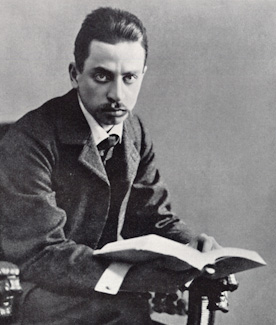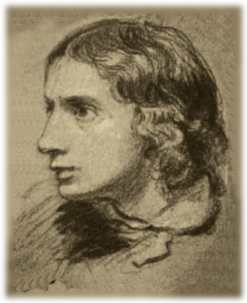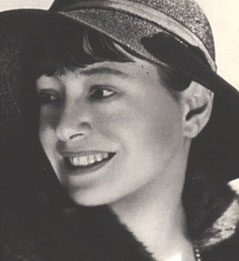Archaic Torso of Apollo by Rainer Maria Rilke
Rilke served for a while as secretary to Auguste Rodin. The sculptor would send him on assignments to observe animals, objects, or great art and then talk about them. This poem could be the result of one of those assignments. The speaker seems to struggle to find the right words to describe the power in the torso of Apollo—he compares it to ripening fruit, a lamp, a beast, a star. This exploration leads to the epiphany in the final line. There, the poem reaches out and grabs the reader. It’s a sudden, unexpected and remarkable shift.
Archaic Torso of Apollo
We cannot know his legendary head
with eyes like ripening fruit. And yet his torso
is still suffused with brilliance from inside,
like a lamp, in which his gaze, now turned to low,
gleams in all its power. Otherwise
the curved breast could not dazzle you so, nor could
a smile run through the placid hips and thighs
to that dark center where procreation flared.
Otherwise this stone would seem defaced
beneath the translucent cascade of the shoulders
and would not glisten like a wild beast's fur:
would not, from all the borders of itself,
burst like a star: for here there is no place
that does not see you. You must change your life.
Translated by Stephen Mitchell
 Rainer Maria Rilke was born in Prague in 1875. He resided throughout Europe during his lifetime, including a 12-year residency is Paris, where he befriending the famed sculptor Auguste Rodin. His best known work includes his Duino Elegies and his Sonnets to Orpheus.
Rainer Maria Rilke was born in Prague in 1875. He resided throughout Europe during his lifetime, including a 12-year residency is Paris, where he befriending the famed sculptor Auguste Rodin. His best known work includes his Duino Elegies and his Sonnets to Orpheus.
Archaic Torso of Apollo
We cannot know his legendary head
with eyes like ripening fruit. And yet his torso
is still suffused with brilliance from inside,
like a lamp, in which his gaze, now turned to low,
gleams in all its power. Otherwise
the curved breast could not dazzle you so, nor could
a smile run through the placid hips and thighs
to that dark center where procreation flared.
Otherwise this stone would seem defaced
beneath the translucent cascade of the shoulders
and would not glisten like a wild beast's fur:
would not, from all the borders of itself,
burst like a star: for here there is no place
that does not see you. You must change your life.
Translated by Stephen Mitchell
 Rainer Maria Rilke was born in Prague in 1875. He resided throughout Europe during his lifetime, including a 12-year residency is Paris, where he befriending the famed sculptor Auguste Rodin. His best known work includes his Duino Elegies and his Sonnets to Orpheus.
Rainer Maria Rilke was born in Prague in 1875. He resided throughout Europe during his lifetime, including a 12-year residency is Paris, where he befriending the famed sculptor Auguste Rodin. His best known work includes his Duino Elegies and his Sonnets to Orpheus.





